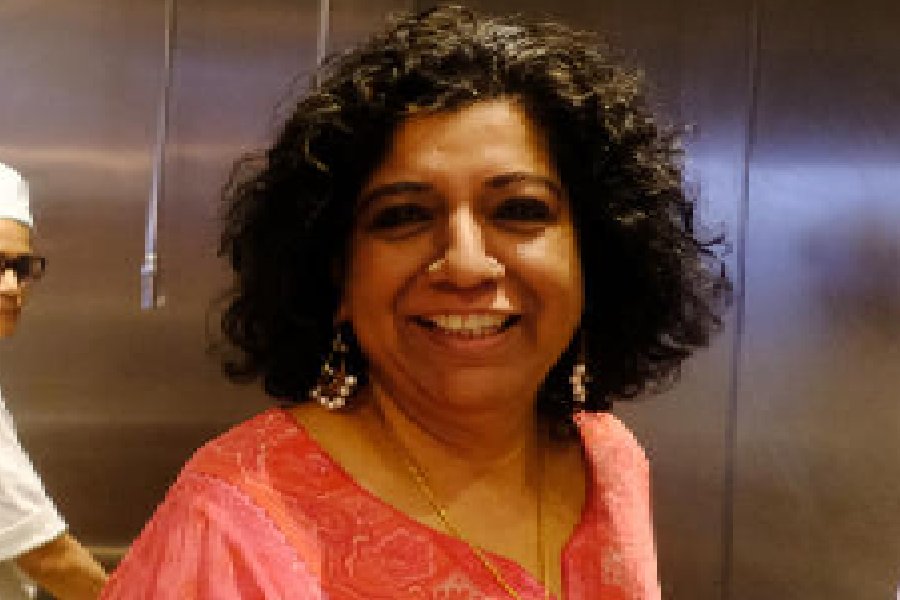If you are interviewing Asma Khan, be prepared to get devoured. She will bombard you with stories, then emerge as an advocate for women’s empowerment, sometimes as a historian, sometimes as a writer... all the while bewitching you with her biryani feelings.
That afternoon, I Zoom to her home in London. It’s morning for Khan, her curly mop of hair is a bit unruly but the spark in her eyes is unmistakable. She has had her chai and is “awake”. And what brew is it? “I am not a delicate Darjeeling tea person; I need the adrak wali chai that slaps me on my face.” I badly want to interrupt and I do. We call it jhatka chai at home, I say, because it jolts me into sitting up. “I guess I just learnt the right word,” she laughs.
For the 53-year-old celebrity chef, strong is clearly the flavour. She is the owner of Darjeeling Express, the restaurant she set up in 2017 in the heart of London. The name is perhaps a metaphor for all that means “home”, specifically a train she rode as a child. Yes, she’s pretty much an Aligarh person — that’s where her ancestral home is — as she is a Calcutta girl, having studied in La Martiniere school and Loreto College. The website for her restaurant reads: “The food is a true homage to my royal Mughlai ancestry and the busy streets of Calcutta, where I grew up.”
I watched Khan on the Netflix documentary Chef’s Table. Did she work on the script? I was curious. “That’s just me speaking,” says she. “I cannot read from a page because then I cannot think.”
And then she takesup the ladle and blends it all.
“I am a storyteller. That’s how we were raised, my sister and me. We were cradled in laps, fed by the hand and told stories. Our food is linked to stories. Stories are a part of who we are... but all those stories of rajas and ranis, jinns and dragons were not read from any book, because every day there was a new twist.” And who was telling these fantastic tales? “My father, the ultimate storyteller.” No wonder then warmth is a regular at her table — “Complete strangers hug me and weep and say, ‘we feel we know you’.”
I feel the urge to stir in a question. A scene in Chef’s Table shows Khan and her team opening a biryani handi right in the middle of the eating space. The aroma, the steam, the whoops, the looks, some eyes closed, is that how she does it?
Turns out that this ceremonial act wasn’t special to the show, but has been her way since the start. “Because I want people to see the degh and feel the emotion. In my Aligarh home, we never experienced this because the biryani was cooked and the lid uncovered back in the kitchen and served to us on platters. I wanted to convey that this is not something ordinary; there’s a sacredness to it. It signifies the gathering of the clan.”
Once again we are in Calcutta. “You see the long queues for biryani during Durga Puja? Here, biryani is not a dish; it’s an emotion. You eat it with people you are at ease with. How do I explain all of that unless I bring the degh in front?” And just like that the chef turns historian for her eating audience, serving nuggets of how the alu got into the Calcutta biryani, about Wajid Ali Shah, about 1857, about Persian culinary influence in royal Muslim households and the spice trade. The flow is endless.
At Darjeeling Express, there’s phuchka and vegetable cutlet, I note. “And at times momos and kati rolls too. Street food is a great leveller. It’s important to celebrate this kind of food where historically food has been used to divide us,” she says, adding in the same breath, “I am the chef advocate of the UN World Food Programme. I go to places of conflict and hunger, to refugee camps. I think a lot of people do not realise what a privilege it is to eat.” Khan is just back from Lebanon, where she cooked with cooperatives of women.
The conversation often dips into food cooked by mothers and grandmothers. It’s an all-woman team of 12 in her kitchen, including two grandmothers. All immigrants who earlier worked as nannies and house helps. Khan has also authored two books, the last being Ammu, which she wrote during the pandemic and which “celebrates the relationship with my mother”.
“I use my restaurant as a form of communication, of our people, of our farmers,” she continues. “I do not fly in vegetables from India or Africa. So no okra, no jackfruit. I don’t need things that come in on planes and then go in refrigerated lorries.” But there’s something she breaks the rule for — mangoes. “Aam to ami khaboi,” she laughs.
The popularity of Chef’s Table brought in more responsibility. “I was flooded with offers to do promotions and partnerships; I could have had a restaurant on the moon. But I do not do a single ad,” she reveals. Neither will she network into the hospitality industry there “which is like an old boys club”. I prod her about possible undercurrents in a male-dominated industry.
“I am not in their space,” pat comes the reply. And then a sweet note: “Anyway, a good thing about being raised by a mother like Ammu is that she teaches you to be well-mannered.”










